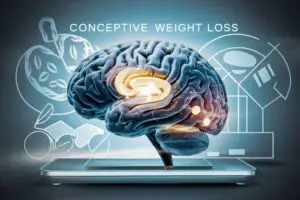The Science Behind Cognitive Weight Loss
The journey towards sustainable weight loss involves more than just counting calories or hitting the gym. Understanding the intricate relationship between our minds and bodies is crucial for achieving long-term success in weight management.
In this article, we will delve into the science behind cognitive weight loss, exploring how cognitive behavioral techniques, neuroplasticity, mindfulness, and other psychological strategies can play a pivotal role in reshaping our habits, attitudes, and behaviors towards food and exercise.
By tapping into the power of our minds, we can uncover new pathways to overcome obstacles, foster healthier choices, and create a positive mindset that supports lasting transformations in our weight and overall well-being.

Table of Contents
ToggleIntroduction to Cognitive Weight Loss
Cognitive weight loss is a relatively novel approach to addressing weight management that focuses on the psychological and cognitive aspects of eating behavior.
This approach recognizes that weight loss is not simply a matter of eating less and exercising more, but involves complex cognitive processes such as decision-making, emotional regulation, and habitual patterns of thinking.
By addressing these underlying cognitive factors, individuals can achieve sustainable weight loss and maintain healthier eating habits in the long term.
Cognitive weight loss interventions typically involve strategies such as cognitive behavioral therapy, mindfulness techniques, and cognitive restructuring to help individuals identify and challenge their maladaptive beliefs and behaviors around food and eating.
Research has shown that cognitive weight loss interventions can be highly effective in helping individuals achieve and maintain weight loss.
By targeting the cognitive processes that drive unhealthy eating behaviors, individuals can develop a greater awareness of their thought patterns and emotional triggers, which in turn can lead to more successful weight management outcomes.
Additionally, cognitive weight loss programs often focus on building skills in areas such as self-monitoring, goal setting, and problem-solving, which can help individuals develop a more positive relationship with food and exercise.
Overall, cognitive weight loss offers a promising approach to weight management that goes beyond traditional diet and exercise recommendations to address the psychological roots of obesity and help individuals make lasting changes to their eating behavior.
Read more about “Exploring the Latest Advances in Alopecia Treatment”
Defining Cognitive Weight Loss
Cognitive weight loss can be understood as a reduction in mental acuity and cognitive functioning that may occur as a result of various factors such as aging, illness, or stress.
This concept encompasses a decline in cognitive abilities including memory, attention, and problem-solving skills, leading to difficulties in performing daily tasks and engaging in intellectual activities.
Cognitive weight loss can have significant implications on an individual’s quality of life and overall well-being, highlighting the importance of early detection and intervention strategies to mitigate its impact.
Further research and exploration into the underlying mechanisms and potential treatment options for cognitive weight loss are essential in order to effectively address this complex phenomenon and help individuals maintain optimal cognitive function throughout their lifespan.
Read more about “What are the Causes and Symptoms of ‘Digital Dementia’?”
What are the Benefits of Cognitive Weight Loss?
Cognitive weight loss refers to the process of losing weight through mental efforts such as changing thought patterns, improving decision-making skills, and increasing self-awareness.
One of the main benefits of cognitive weight loss is its long-term effectiveness compared to traditional weight loss methods. By addressing the underlying psychological factors that contribute to weight gain, individuals are able to make sustainable lifestyle changes that lead to lasting weight loss. This approach also helps individuals develop a healthier relationship with food and improve their overall well-being.

Another advantage of cognitive weight loss is its focus on holistic health and wellness. In addition to promoting physical health through weight loss, this method also emphasizes mental and emotional well-being.
By challenging negative thought patterns and beliefs about food and body image, individuals can improve their self-esteem and mental health.
Cognitive weight loss also encourages individuals to cultivate mindfulness and self-compassion, which can lead to a more balanced and fulfilling life.
Overall, cognitive weight loss offers a comprehensive approach to achieving and maintaining a healthy weight that addresses both physical and psychological aspects of well-being.
Read more about “Emotional Numbness: The Hidden Epidemic and How to Break Free?”
How Thoughts Influence Eating Habits and Weight?
Our thoughts are important in shaping our eating habits and weight. The idea of cognitive dietary restraint indicates that individuals who constantly monitor and restrict their food intake because of dieting or weight management thoughts may be more likely to develop disordered eating behaviors and encounter weight fluctuations.
Negative thoughts about food, body image, and self-esteem can lead to unhealthy eating patterns and the use of emotional eating as a coping mechanism. Additionally, self-perception and body image can greatly impact one’s eating habits and weight.

People who have negative thoughts about their body may be more likely to engage in restrictive or binge eating behaviors, which can contribute to weight gain or loss depending on the individual’s coping mechanisms.
Moreover, thoughts can also affect weight through the concept of the mind-body connection. Studies have shown that stress, anxiety, and negative emotions can trigger the release of cortisol, a hormone that increases appetite and promotes the storage of fat, particularly in the abdominal region.
This stress-induced eating can lead to weight gain and difficulty in maintaining a healthy weight. Positive thoughts, on the other hand, can promote mindful eating, self-acceptance, and a healthy relationship with food, which can contribute to long-term weight management success.
Therefore, it is essential for individuals to understand the power of their thoughts in influencing their eating habits and weight, and to cultivate positive thinking patterns to achieve a healthy balance in their daily dietary choices.
Read more about “How Focused Thinking Can Transform Your Body?”
The Intersection of Psychology and Weight Management
The intersection of psychology and weight management is a critical area of study that explores the complex relationship between mental health and physical well-being.
Research has shown that psychological factors such as stress, emotions, and self-esteem play a significant role in determining an individual’s weight and ability to maintain a healthy lifestyle.
For example, individuals who struggle with emotional eating may turn to food as a coping mechanism for stress or depression, leading to weight gain.
Understanding these underlying psychological issues is essential for developing effective weight management strategies that address not only diet and exercise but also mental health and emotional well-being.
Furthermore, psychology plays a crucial role in shaping individuals’ attitudes and beliefs about weight management. Negative self-perceptions and unrealistic body ideals propagated by society can contribute to low self-esteem and body dissatisfaction, which in turn can hinder efforts to lose weight and maintain a healthy lifestyle.
Psychologists can help individuals develop a positive mindset and healthy relationship with food and exercise, empowering them to make lasting changes to their habits and behaviors.
By incorporating psychological principles into weight management programs, professionals can offer comprehensive support that targets both the physical and mental aspects of health. This approach can result in better long-term results for people looking to reach and sustain a healthy weight.
The Role of Cognition in Weight Management
Cognition plays a critical role in weight management as it influences our thoughts, beliefs, and behaviors related to food and exercise. Our cognitive processes, such as decision-making, impulse control, and motivation, affect our ability to make healthy choices and stick to a weight management plan.
For example, individuals with higher levels of cognitive flexibility may be better able to adapt to changing circumstances and adjust their eating and exercise habits accordingly.
Additionally, cognitive distortions, such as all-or-nothing thinking or emotional reasoning, can negatively impact weight management by leading to unhealthy behaviors like binge eating or excessive exercise.
Furthermore, cognition also plays a role in the development and maintenance of dietary habits and emotional eating patterns. Our cognitive processes determine how we perceive and interpret food cues, such as cravings or hunger signals, which in turn influence our eating behaviors.
Cognitive behavioral therapy, a common approach used in weight management programs, helps individuals identify and challenge maladaptive thought patterns and behaviors related to food and body image.

By improving cognitive skills such as problem-solving and self-regulation, individuals can develop a healthier relationship with food and body, leading to long-term success in weight management.
In short, cognition is a fundamental factor in weight management, influencing our choices, behaviors, and habits related to food and exercise. By understanding and addressing cognitive processes, individuals can improve their ability to make healthy choices and successfully manage their weight.
Introduction to Cognitive Behavioral Therapy for Weight Loss
Cognitive behavioral therapy (CBT) has been increasingly recognized as an effective tool for weight loss management. This approach combines cognitive strategies, such as identifying negative thought patterns and beliefs about food and body image, with behavioral techniques, such as implementing healthier eating habits and increasing physical activity.
CBT targets the root causes of overeating and unhealthy lifestyle habits, aiming to help individuals develop a more positive relationship with food and their bodies.
By addressing both the cognitive and behavioral aspects of weight loss, CBT can lead to sustainable and long-term changes in eating behaviors and overall well-being.
Research has shown that CBT for weight loss is particularly effective when combined with other components, such as dietary counseling and exercise programs.
A key principle of CBT is helping individuals identify and challenge their unhealthy beliefs and behaviors around food and eating. By encouraging mindfulness and self-awareness, individuals can learn to recognize triggers for overeating and develop healthier coping mechanisms.
Additionally, CBT focuses on setting realistic and achievable goals, empowering individuals to make gradual changes and track their progress over time. Overall, CBT offers a holistic approach to weight loss that goes beyond simply counting calories, providing individuals with the tools and skills to make lasting changes to their lifestyle to achieve their weight loss goals.
Neuroplasticity and Habit Formation
Neuroplasticity is the brain’s remarkable ability to reorganize and adapt itself in response to experience, learning, and injury. This phenomenon allows neurons to form new connections and strengthen existing ones, essentially rewiring the brain to adapt to new circumstances.
This process plays a crucial role in habit formation, as repeated behaviors can lead to long-lasting changes in the neural pathways associated with those behaviors.

For example, when someone consistently engages in a particular activity, such as practicing a skill or exercising regularly, the brain adapts by strengthening the connections between neurons involved in engaging in that activity will make it become easier and more automatic as time goes on.
Habit formation is closely tied to neuroplasticity, as the brain’s ability to reorganize itself in response to repeated behaviors is what allows habits to form in the first place.
Understanding this relationship can be particularly useful for individuals looking to adopt healthier habits or break bad ones. By consciously engaging in positive behaviors and consistently repeating them, individuals can essentially train their brains to prefer those behaviors over time.
This process can be challenging, as breaking long-standing habits requires effort and persistence, but knowing that the brain is capable of change can be empowering.
Ultimately, recognizing the power of neuroplasticity can help individuals leverage their brain’s ability to adapt and form healthier habits that can improve their overall well-being.
The Role of Mindfulness in Weight Management
Mindfulness has emerged as a critical tool in weight management, as it promotes self-awareness and a deeper connection with one’s body and emotions.
By practicing mindfulness, individuals can become more attuned to their hunger cues and eating habits, making it easier to make healthier choices and manage portions.
Research has shown that mindfulness can also help decrease emotional eating, as individuals learn to recognize and address the underlying emotions that trigger overeating.
Additionally, mindfulness can reduce stress levels, which are often linked to weight gain, by promoting relaxation and reducing the release of cortisol, a stress hormone that can contribute to weight retention.
Furthermore, mindfulness can help individuals develop a more positive relationship with food and their bodies, leading to sustainable weight management goals.
By being present in the moment and mindful of their actions, individuals can cultivate a greater sense of self-control and prevent impulsive eating behaviors.
Additionally, mindfulness techniques, such as meditation and deep breathing exercises, can enhance self-regulation and decision-making skills, enabling individuals to make conscious and intentional choices about their eating habits.
Overall, incorporating mindfulness practices into a weight management program can lead to long-term success and improved overall well-being.
Neurological Factors Impacting Weight Loss
Neurological factors play a crucial role in determining an individual’s ability to lose weight. The brain regulates hunger, satiety, and metabolism through complex neurochemical and hormonal pathways.
For example, the hypothalamus, a key region in the brain, integrates signals from the body regarding energy balance and coordinates responses that influence appetite and energy expenditure.
Additionally, neurotransmitters such as dopamine and serotonin play a role in regulating cravings and emotional eating behaviors. Dysfunction in these pathways can lead to difficulties in controlling food intake and weight gain.
Moreover, emerging research suggests that chronic stress and inadequate sleep can have a significant impact on weight loss efforts through their effects on the brain.
Chronic stress can lead to dysregulation of the hypothalamic-pituitary-adrenal (HPA) axis, resulting in increased cortisol levels and cravings for high-calorie foods.
Sleep deprivation, on the other hand, disrupts hunger hormones such as ghrelin and leptin, leading to increased appetite and decreased energy expenditure.
Understanding and addressing these neurological factors are essential for successful weight loss strategies, as interventions that target these pathways can help individuals achieve and maintain a healthy weight.
Examination of the Impact of Stress on Weight Gain
Stress is a complex psychological and physiological response to various environmental stimuli, and research has shown that it can have a profound impact on weight gain.
When individuals experience chronic stress, their bodies release cortisol, a hormone that triggers the release of glucose into the bloodstream for energy.
However, prolonged exposure to high levels of cortisol can lead to increased appetite, cravings for high-calorie foods, and the accumulation of abdominal fat. Additionally, stress can also disrupt sleep patterns and decrease motivation for exercise, further contributing to weight gain.
Therefore, it is crucial to recognize the role of stress in weight management and adopt strategies to mitigate its impact, such as engaging in stress-reducing activities like meditation, exercise, and proper time management. By addressing stress levels, individuals can better manage their weight and overall health.
Overcoming Psychological Barriers to Weight Loss
Weight loss is often a challenging journey, not just physically, but mentally as well. Many individuals face psychological barriers that hinder their ability to successfully lose weight.
These barriers can include fear of failure, emotional eating, negative self-image and low self-esteem. Overcoming these psychological barriers is essential in achieving long-term weight loss success.
One way to overcome psychological barriers to weight loss is by developing a positive mindset and self-belief. It is important for individuals to recognize their worth and potential, and to believe in their ability to achieve their weight loss goals.
Seeking support from friends, family or a therapist can also help individuals tackle emotional eating and negative self-image issues.
Additionally, practicing self-care activities such as meditation, yoga or journaling can help individuals reduce stress and improve their mental well-being, making it easier to stick to a healthy eating and exercise routine. Overall, addressing and overcoming psychological barriers is crucial for sustainable weight loss and overall well-being.
Strategies for Changing Negative Thought Patterns Related to Food
In addressing negative thought patterns associated with food, it is important to implement strategies that promote positive change and a healthier relationship with eating.
Cognitive-behavioral therapy (CBT) has been proven effective in targeting and altering negative thought patterns by identifying and challenging irrational beliefs surrounding food.
For example, reframing negative self-talk such as “I am weak for giving into cravings” to “It’s okay to indulge in moderation” can help shift perspectives from self-criticism to self-compassion.
Additionally, mindfulness techniques, such as practicing mindful eating and meditation, can enhance awareness of triggers for negative thoughts and promote a nonjudgmental attitude towards food choices.
Incorporating stress-reduction activities, adequate sleep, and regular exercise can also contribute to a more balanced mindset when it comes to food consumption.
By combining these strategies within a structured plan tailored to the individual’s needs, one can effectively combat negative thought patterns related to food and cultivate a more positive outlook on nutrition and overall well-being.
Importance of Setting Realistic Goals for Sustainable Weight Loss
It is important to set achievable goals in order to maintain long-term weight loss success. When individuals set unattainable or unrealistic goals, they often become discouraged and may give up on their weight loss journey altogether.
By setting achievable goals, such as losing 1-2 pounds per week or increasing physical activity by a certain amount each day, individuals are more likely to stay motivated and stay on track.
Furthermore, setting realistic goals allows individuals to make gradual changes to their habits and lifestyle, which are more likely to be maintained in the long run.
Sustainable weight loss requires dedication, patience, and consistency, all of which can be facilitated by setting smaller, achievable goals that contribute to overall success. Therefore, it is crucial for individuals embarking on a weight loss journey to set realistic goals that align with their capabilities and commitment level.
Tips for Incorporating Exercise into a Cognitive Weight Loss Plan
When incorporating exercise into a cognitive weight loss plan, it is essential to prioritize consistent and sustainable physical activity. It is crucial to set realistic goals and gradually increase the intensity and duration of workouts to avoid burnout or injury. Exercise should be viewed as a non-negotiable part of daily routine rather than a temporary fix for weight loss.
Incorporating a variety of activities such as cardio, strength training, and flexibility exercises can ensure overall fitness and prevent boredom.
Additionally, seeking guidance from a certified personal trainer or fitness professional can help tailor an exercise program that aligns with individual goals, abilities, and limitations.
Mindful planning and tracking progress are also key components in maintaining motivation and adherence to the exercise regimen within a cognitive weight loss plan.
How to Apply Cognitive Techniques for Sustainable Weight Management?
Applying cognitive techniques for sustainable weight management involves developing a deeper understanding of one’s thoughts, emotions, and behaviors surrounding food and exercise.
By actively monitoring and challenging negative thought patterns related to body image or eating habits, individuals can begin to reframe their beliefs about food and self-worth.
Cognitive-behavioral therapy (CBT) is an evidence-based approach that encourages individuals to replace unhelpful thoughts with more positive and constructive ones, leading to healthier choices and habits in the long run.
Additionally, practicing mindfulness techniques can help individuals become more attuned to their hunger cues and emotional triggers that may lead to overeating.
By incorporating these cognitive strategies into their daily routines, individuals can take control of their relationship with food and achieve sustainable weight management goals in the professional setting.
Case Studies Illustrating Successful Cognitive Weight Loss Journeys
Weight loss is a complex journey that involves not only physical changes but also mental shifts in behavior and lifestyle choices. Cognitive weight loss journeys are particularly fascinating as they highlight the power of the mind in transforming one’s relationship with food and exercise.
One successful case study that stands out is that of a middle-aged woman who struggled with obesity for years before she decided to seek help from a cognitive therapist.
Through sessions focused on changing her negative thought patterns and beliefs about food, she was able to develop healthier eating habits and a more positive self-image. As a result, she lost over 50 pounds and has been able to maintain her weight loss long-term.
Another inspiring case study involves a young man who had always struggled with his weight due to emotional eating and lack of exercise.
Through working with a cognitive behavioral therapist, he was able to identify triggers for his unhealthy eating habits and develop coping strategies to address them.
By focusing on changing his mindset and developing healthier habits, he was able to lose over 100 pounds and improve his overall well-being.
These case studies demonstrate the power of cognitive interventions in weight loss journeys, highlighting the importance of addressing the underlying psychological factors that contribute to unhealthy behaviors. By harnessing the power of the mind, individuals can achieve sustainable weight loss and improve their overall quality of life.
Future Directions in Cognitive Weight Loss Research
The field of cognitive weight loss research is rapidly evolving, with new directions and approaches opening up exciting possibilities for the future.
One promising avenue of inquiry is the use of advanced neuroimaging techniques to better understand how cognitive processes, such as decision-making and self-regulation, influence weight loss outcomes.
By pinpointing the specific brain regions and networks involved in successful weight management, researchers can develop more targeted interventions and personalized strategies for individuals struggling with obesity.
Additionally, the integration of cutting-edge technologies, such as virtual reality and mobile health apps, holds great potential for enhancing the effectiveness and accessibility of cognitive weight loss interventions.
As the field continues to advance, interdisciplinary collaborations between psychologists, neuroscientists, and public health experts will be essential in pushing the boundaries of cognitive weight loss research and improving the challenges faced by the people with obesity.
Highlighting the Effectiveness of Cognitive Approaches to Weight Loss
Cognitive approaches to weight loss have shown promising results in helping individuals achieve and maintain a healthy weight. These approaches focus on changing thoughts, beliefs, and behaviors related to food and eating, ultimately leading to long-term success.
By addressing the underlying thought patterns and emotional triggers that contribute to overeating or unhealthy eating habits, individuals can develop healthier relationships with food and make more mindful choices.
Additionally, cognitive approaches often incorporate strategies such as goal setting, self-monitoring, and problem-solving skills to support behavior change.
Overall, research has demonstrated that cognitive approaches to weight loss can be effective in promoting sustainable weight management and improving overall well-being.
Conclusion:
In conclusion, the science behind cognitive weight loss offers a promising approach for individuals seeking not just temporary results, but lasting lifestyle changes. By harnessing the power of our minds and understanding the interplay between cognition, behavior, and weight management, we can pave the way for sustainable success in our wellness journey.
Through continued practice of cognitive techniques, mindfulness, and behavioral strategies, we can empower ourselves to break free from old patterns, embrace healthier habits, and embark on a transformative path towards a healthier, happier life.
FREQUENTLY ASKED QUESTIONS
1. How does cognitive weight loss differ from traditional weight loss methods?
Cognitive weight loss differs from traditional weight loss methods in its focus on changing individuals’ behaviors, beliefs, and attitudes towards food and exercise. Rather than solely relying on calorie counting or strict dieting rules, cognitive weight loss addresses the underlying emotional and psychological factors that contribute to unhealthy eating habits. This approach emphasizes self-awareness, mindfulness, and strategies for managing stress and emotional triggers that may lead to overeating.
By changing thought patterns and developing healthier coping mechanisms, individuals can sustain long-term weight loss results. Traditional weight loss methods often neglect the importance of addressing these psychological factors, focusing instead on quick fixes or temporary solutions. In contrast, cognitive weight loss promotes lasting lifestyle changes that support overall well-being and mental health in addition to physical health.
2. How cognitive weight loss techniques aid in managing emotional eating and binge eating habits?
Utilizing cognitive strategies for weight loss can greatly assist in managing emotional eating and binge eating habits. By focusing on changing thought patterns, cognitive therapy can help individuals understand underlying emotional triggers that drive their eating behaviors. Cognitive-behavioral techniques such as identifying negative thought patterns, challenging irrational beliefs, and developing coping strategies can empower individuals to make healthier food choices and manage stress without turning to food for comfort.
Moreover, cognitive weight loss interventions can enhance self-awareness, emotional regulation skills, and mindfulness practices which are crucial in breaking the cycle of emotional eating and bingeing. Overall, by incorporating cognitive strategies into weight loss programs, individuals struggling with emotional or binge eating tendencies can develop a healthier relationship with food and achieve long-lasting success in managing their weight and overall well-being.
3. Are there specific cognitive strategies that can be used to overcome plateaus in weight loss progress?
Plateaus in weight loss progress are a common frustration among individuals striving to achieve their fitness goals. To overcome these plateaus, there are specific cognitive strategies that can be employed. One such strategy is setting realistic and achievable short-term goals, which can help maintain motivation and focus. It is also important to analyze and modify dietary habits by tracking food intake and making necessary adjustments to ensure continued progress.
Additionally, incorporating variety into exercise routines can prevent stagnation and boost metabolism. Furthermore, practicing mindfulness techniques such as meditation or deep breathing can reduce stress levels, which may be a contributing factor to weight loss plateaus. By implementing these cognitive strategies, individuals can break through plateaus and continue on their journey towards successful weight loss outcomes.
4. How can individuals integrate cognitive approaches into their existing weight loss plans and routines effectively?
Individuals can integrate cognitive approaches into their existing weight loss plans by first understanding the role of thoughts and beliefs in shaping behaviors. Cognitive-behavioral therapy (CBT) can help individuals identify and challenge negative thought patterns that may be hindering their progress towards weight loss goals.
Techniques such as self-monitoring, goal-setting, and cognitive restructuring can help individuals develop healthier habits and maintain motivation throughout the weight loss journey. By changing their thought processes, individuals can better cope with setbacks and challenges that may arise, leading to more sustainable and long-term weight loss success.
It is essential for individuals to work with a qualified therapist or healthcare professional who specializes in CBT to effectively integrate these approaches into their existing weight loss plans and routines.


